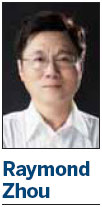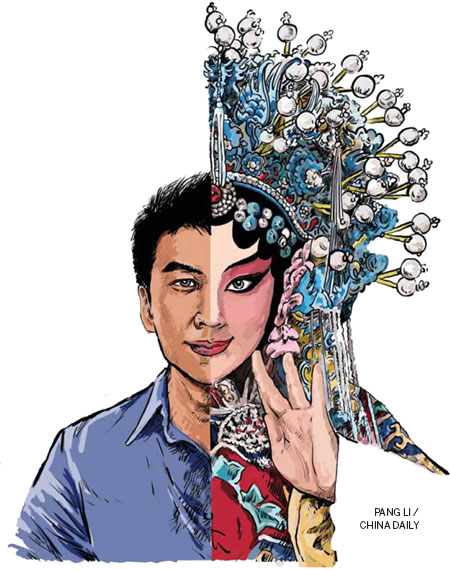Artistic transcendence meets gender politics
Updated: 2013-10-25 10:02
By Raymond Zhou (China Daily Europe)
|
|||||||||||
In China, public fascination with cross-dressing performances falls neatly into high-brow and low-brow
What had seemed like a frivolity to me suddenly took on social gravitas when I was asked to provide comments for a reality television show to be aired later this year.
Creative Sky, on the movie channel of China Central Television, is in its fifth season, and each episode brings out a quartet of contestants who are required to conceive and make costumes and accoutrements in a certain style. Of the six episodes I took part in as a judge, two were about dressing men as women. The last time I thought seriously about this phenomenon was when the biopic Forever Enthralled, about the celebrated cross-dressing Peking Opera superstar Mei Lanfang, was released in 2008.
The most inspiring example of hiding one's gender in Chinese history, or at least in Chinese legend, is Mulan, known to every child in China before Disney made her known across the world. Mulan did it out of necessity. She volunteered to take the place of her ailing father for military service. After watching all the live-action film versions, I reached the conclusion that it must be fictional. There was no way a female could pass convincingly as a male for more than a week unless her contact with other soldiers were kept to a minimum, which would have been impossible.
Still, that was a beautiful story immersed in family values. Except the scene when Mulan reappeared as a woman, which is lovingly described in the original poem, there is nothing sexual or titillating about her gender-disguising feat.
Other than Mulan, there are not many tales in China that feature cross-dressing in the style of serious drama. Many male stars, such as Andy Lau and Tony Leung, have appeared in brief scenes in the guise of the fair sex. But invariably it is for comic effect. Comedy, it seems, is the panacea against possible moral grandstanding and denunciation.
It is obvious that in China cross-dressing, especially men dressed as women, is still frowned upon. One can imagine how fortuitous it was for Xiao Shenyang to play a sissy waiter in a skirt on the all-important Chinese New Year's Eve Gala and break out into stardom. For one thing, he called it "a Scottish kilt". That persona was so engraved in public consciousness that many forgot it was not inventive at all, but was a staple with the Northeastern folk entertainment known as "two-person twirling".

The public lapped it up as if they had never seen anything like it. For most of the population not familiar with the nation's theatrical scene, it was indeed eye-opening.
While Xiao Shenyang is a comedian, Li Yugang has established himself as a singer. What makes him unique is that he can sing in both male and female voices, and his appearance as a female is so radiantly gorgeous that it has become his calling card. Even though he is not trained in the rigorous routines of Peking Opera, he conjures up the glory of Mei Lanfang.
In fact, cross-dressing performances in today's China are tolerated mainly in the framework of traditional opera or as part of the revival of traditional culture. In the old days, men and women were not allowed to appear together on the stage, thus giving rise to all-male or all-female performing styles, as in Elizabethan England. With the founding of New China, males and females could, and indeed were encouraged to, perform together. For a while, gender-disguising practices seemed a thing of the past.
Now I'm sure Western readers will laugh that all these elaborate traditions are but a pretense for transvestism or homosexuality. But the truth is probably more complicated.
In the Golden Palm-winning film Farewell My Concubine there are hints that the boy was straight when he was first enrolled in an opera school. It was literally beaten into him that he must take himself as a girl since he was assigned to play exclusively female roles. While empirical evidence shows the percentage of gays in this profession is higher than the general population, it would be wrong to make sweeping assumptions. By simply talking to some of the models who appear on the TV show in drag, it was pretty obvious to me some of them took it for nothing more than a job. If playing male roles would get them more money, they wouldn't think twice but switch gender roles.
More than the rationale for performing in women's clothing is the analysis of the audience, an area where China diverges sharply from a Western country. While drag shows in San Francisco, for example, attract predominantly young males or gays, the most loyal audience in China for an artist like Li Yugang is made up of females and the elderly, the more conservative strata of society. I queried a few of them, and their answers were illuminating.
They totally accept men as men and women as women. That is the norm on stage or on screen. But when a man plays a woman so exquisitely, he is actually "more feminine than a woman". This is a refrain heard all around. It dawned on me that it's the transcendence that makes the magic. Think of all the Hollywood actors who drastically changed their looks and brought home the golden statuettes. Well, Chinese audiences tend to give extra points for credible turnouts that transform the actor's gender in appearance or singing voice.
That is why Mei Lanfang was a national treasure and cross-dressing opera performance a high art. The actor has to be "more feminine than a woman" but he must not cross over into farce. There is often a restraint in the sumptuousness of the costume and makeup.
Still, authorities are not yet comfortable with all cross-dressing shows, inadvertently making such shows in Thailand wildly popular with Chinese tourists, who harbor a mixture of curiosity, mild put-down and secret admiration. It remains to be seen whether Li Yugang, now enshrined in State sponsorship, will be an isolated case or a pioneer like Mei. (Unlike Mei, he dons both male and female garb.)
Outside the pantheon of high art or the shelter of low comedy are few discussions about the meaning of such gender-twisting attempts. Of course there are people who are concerned with the loss of masculinity, not just of a few performers, but of a whole nation. But looked another way, the scale is tipped slightly toward women as men dressed as women are inherently perceived a peg down from their traditional male dominance and therefore are more embraced by women. It's almost a visualization of exploring one's "feminine side".
As long as people are not forced into such practices, how one dresses or how one identifies with gender roles is ultimately a private matter. Like all experiments or obsessions, it could be a fad or it could have psychological roots. But only a few can elevate it into art. Only then will the public find beauty in it.
Contact the writer at raymondzhou@chinadaily.com.cn

(China Daily European Weekly 10/25/2013 page30)
Today's Top News
Mythbuster dispels fictions about China
Forum urges stableChina-Japan ties
NSA spying hurts US diplomacy
Carrier rocket sent to launch base for moon landing
Requirements cut for business startups
Study shows PM1 most harmful
Cold snap to sweep NE, N China
Paper apologizes for reporter's untrue stories
Hot Topics
Lunar probe , China growth forecasts, Emission rules get tougher, China seen through 'colored lens', International board,
Editor's Picks

|

|

|

|

|

|





